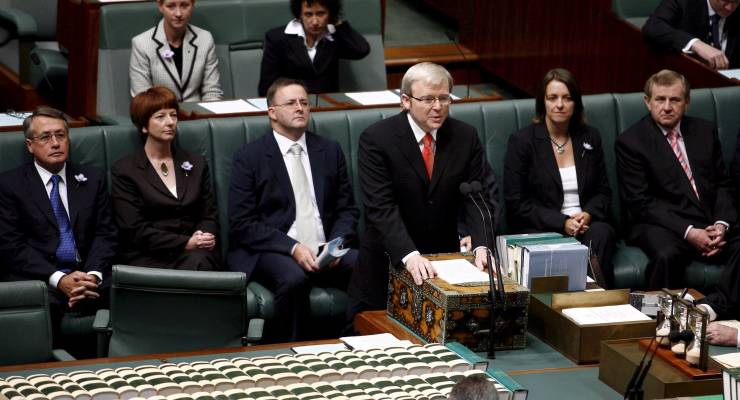
Sorry may be the hardest word — but obviously changing the Australian constitution is even harder.
Former Kevin Rudd speechwriter Tim Dixon, who helped write the 2008 Apology to Australia’s First Nations peoples, is watching keenly as Prime Minister Anthony Albanese and his team work to convince voters to say Yes to an Indigenous Voice to Parliament.
“It’s interesting, because there is a parallel there — they’re not the same thing. It does feel like a natural evolution,” Dixon told Crikey. “The difference between 2008 and 2023 is politics is more polarised. And the fracturing of the media environment means that outlets tend to cater to the more highly engaged and more hard-line groups.”
Dixon also said he felt there was less diversity and “fewer liberal voices” inside the Liberal Party this time around than in 2008 when the Coalition reluctantly offered bipartisanship for the Apology.
“The [Liberal] Party did debate the Apology, as Dutton represents — he was one of the guys who didn’t support it — and likewise, they weren’t that far from supporting the Voice. Just look at half of the state Coalition leaders who support it,” he said.
“But part of the difference now is that the base of political parties are more polarised and the Liberal Party in particular is struggling with branches that are just significantly more extreme and hard-line than most Liberal voters.”
In the 15 months since Albanese was elected on a promise of calling a referendum on the Voice, support for the proposal has decreased.
Dixon said the solution to Albanese’s problem was to get specific and concrete to try to reach the “vast majority of people who are disengaged” with politics.
“The challenge is to point to the really concrete benefits of the Voice and reach the significant number of Australians who haven’t really made up their minds and are cautious — not politically conservative — but just cautious about change, and who don’t want us to do the wrong thing,” he said.
“For example, there is a problem [particularly among First Nations peoples] with rheumatic heart disease. We’ve been talking about it forever, but we don’t make progress on it, because those voices aren’t being heard. And you’ve got all these government bureaucracies but they’re not likely to change that.
“Or look at Juukan Gorge, where Rio Tinto blew up really important, historical rock paintings. Why did that happen? There was a local group there that had been fighting that issue for years.
“If you’ve got a Voice, you have a better mechanism [to deal with it] … I think in some ways, the strongest argument is: governments and bureaucracies keep failing. This is about giving the voice directly to Indigenous people — let’s cut through the bureaucracy. That would resonate with a lot of Australians.”
(Albanese might have recently made it harder for himself to use the Juukan Gorge argument, should he wish to — in the past 24 hours, he’s been pilloried for wearing a custom Rio Tinto shirt, helpfully marked “Anthony” on the chest pocket, during a tour of a Western Australian mine.)
In Dixon’s view, the challenge of reaching the politically disengaged explained why many recent conservative campaigns had succeeded where progressive ones had failed: “Because they are more attuned to the concrete reality, rather than concepts and ideas.”
Dixon spoke to Crikey ahead of an episode of the SBS show Insight, airing tonight, focused on the power of apologies, political and otherwise.
Dixon saw Rudd’s 2008 speech as a unifying moment that allowed Australia to begin moving forward.
“I think what we did was talk to the whole country in a way that was honest about the brutality and horrendous injustice of the Stolen Generations, but also kind of doing that in a way that could resonate with everybody, without abandoning every positive thing about Australian history,” he said.
He remembered the time spent preparing for the speech as “incredibly chaotic”: “A lot of people were involved … and also we had just come into government [months before]. I think from memory I had five speeches to write for that day.
“And Kevin Rudd’s style is always being kind of last minute — I think we went to Parliament at nine in the morning, and I was still making changes at quarter to eight.
“Most things in Rudd’s prime ministership were done somewhat by the seat of his pants, because he really did cram, like a student waiting until the last night. That was part of his undoing in the end because he burnt out too many people and his cabinet ministers.
“But I think in this instance [it worked] because of all the other work done beforehand and because he had emotionally engaged and had meaningful encounters with people who had been separated from their families.
“I think that’s why it worked, but in the end, it’s not about the prime minister. The significance is the milestone it represents for the country.”








Is Albanese thinking the vote will pass because HE is PM? If so, it’s a very wrong thought process because so fare everything we expe ted from him has gone to s#×t. Everything he’s done has been half-hearted because? His mind is elsewhere, mixing with the big moneyed people – really big moneyed people, some who make more in a day than Albanese does in a year, and the power that much money gives them, nad how the little people are afraid to say ‘Boo,’ to them – and guess who else doesn’t have the spine to do what he should against those people and for his countrymen and women.
Leaders need to accentuate the positive, harness the power of positive thinking in the electorate. Only then will people feel inclined and be motivated to vote YES.
the ancient Greeks had a word for someone who was disinterested in politics, it translates roughly as “idiot”
I agree, keep the message simple & with a couple specifics eg: Juukjan Gorge’s desecration.
The public also need to be reminded that Dutton was wrong not to attend the Sorry speech & that he admitted so years later. Australia should be warned Dutton is repeating that mistake.
WA law says you can’t destroy Aboriginal Heritage sites without Ministerial approval, which is always given to miners. Juukan Gorge was a site of world importance concerning the history of the human race. But so what? This is WA, and the miners own it. Fortunately the place with the most amazing aboriginal rock engravings is in hills made entirely of sandstone. Only the ‘worthless’ is safe here.
Except that as the writer notes, he’s blown that chance by sporting a personalized Rio Tinto shirt, effectively rubbing salt into the wound.
Albo is a very good PM but a lousy campaigner. Unless there is a quick and radical rethink of the very lack lustre ‘Yes’ campaign, it will go down. Consigning the issue to a committee was a very bad idea. The ‘No’ case in the AEC pamphlet is punchy and accessible, in the usual stupid way that conservative campaigns are. But they work unless countered by imaginative and gripping counter narratives. I just don’t see that coming from the affirmative case at the moment, and we are running out of time.
The no case in the pamphlet is pretty much not worth the paper it’s written on. TBH, (and crude). I wouldn’t wipe my a*** with it. I spent 15 minutes marking it. It would get an “F” for sheer blatant disregard for the existence of fact checkers, and an A+ for fear mongering…. If I was a qualified teacher, that is.
Intersting assessment that “Albo is a very good PM”- could you provide a single example of ‘good PMing’?
Little things like that tax #3, environment, attack…sorry, defense, Assange, HAFFing a larf at the homeless…. plz ‘splain.